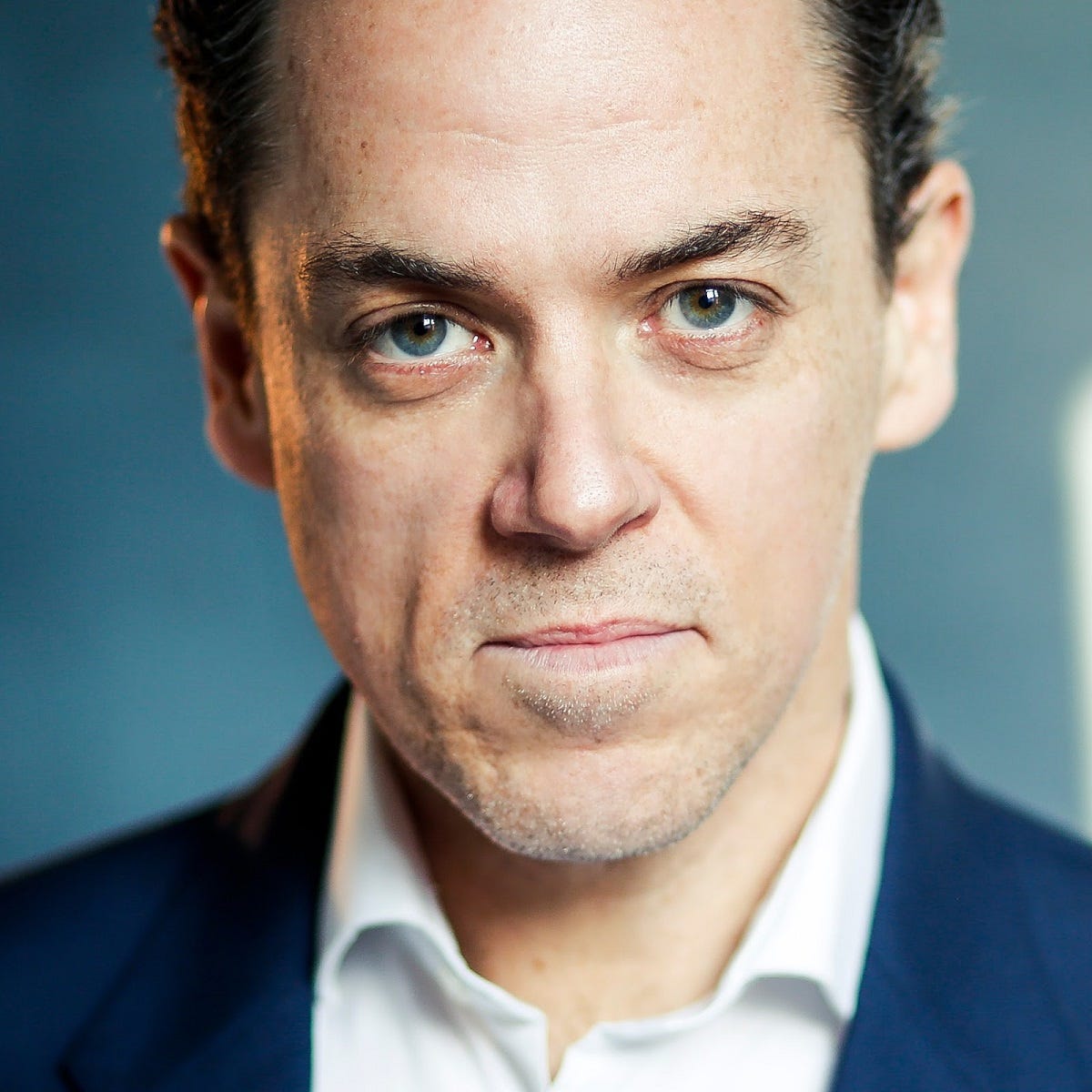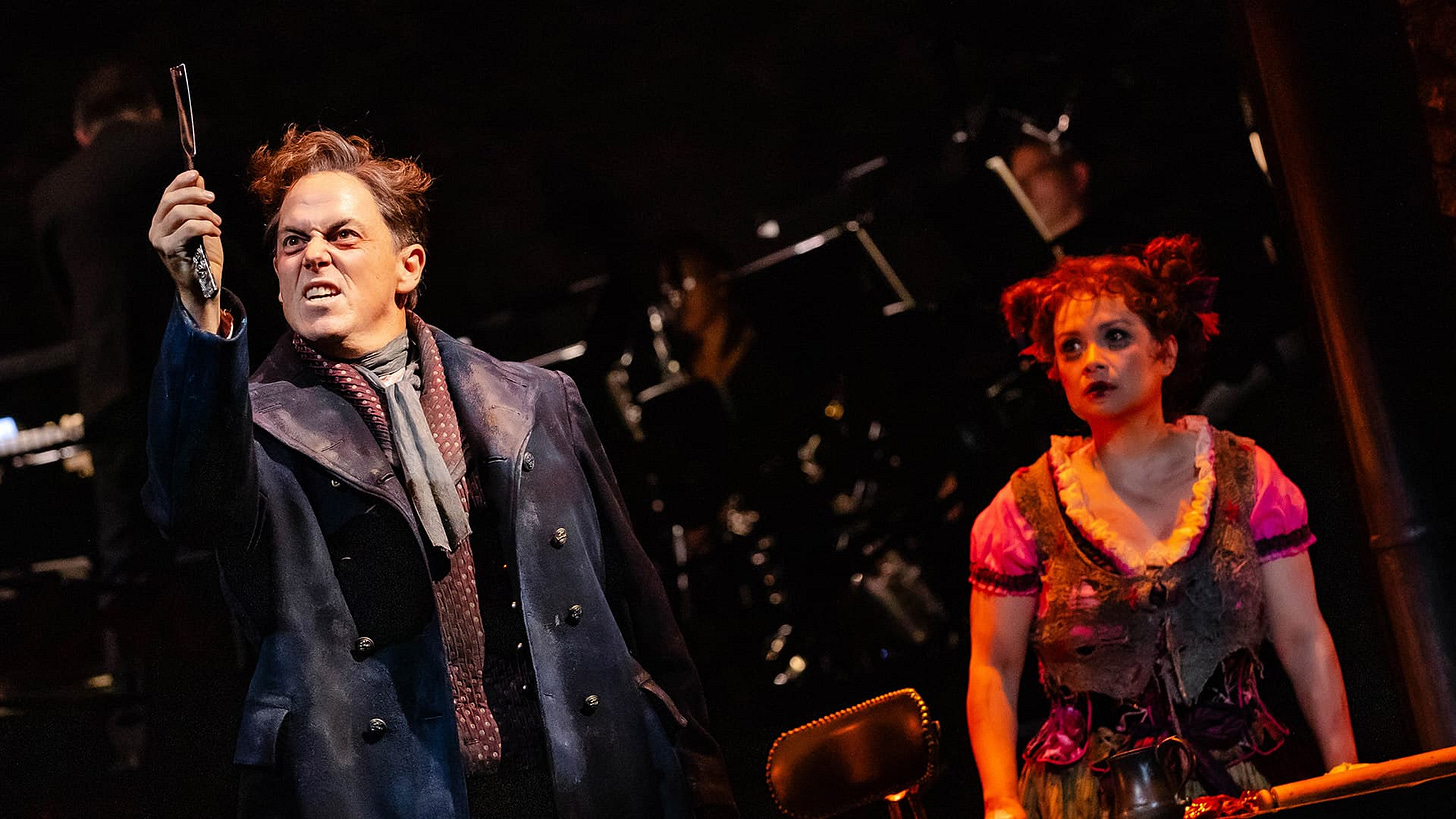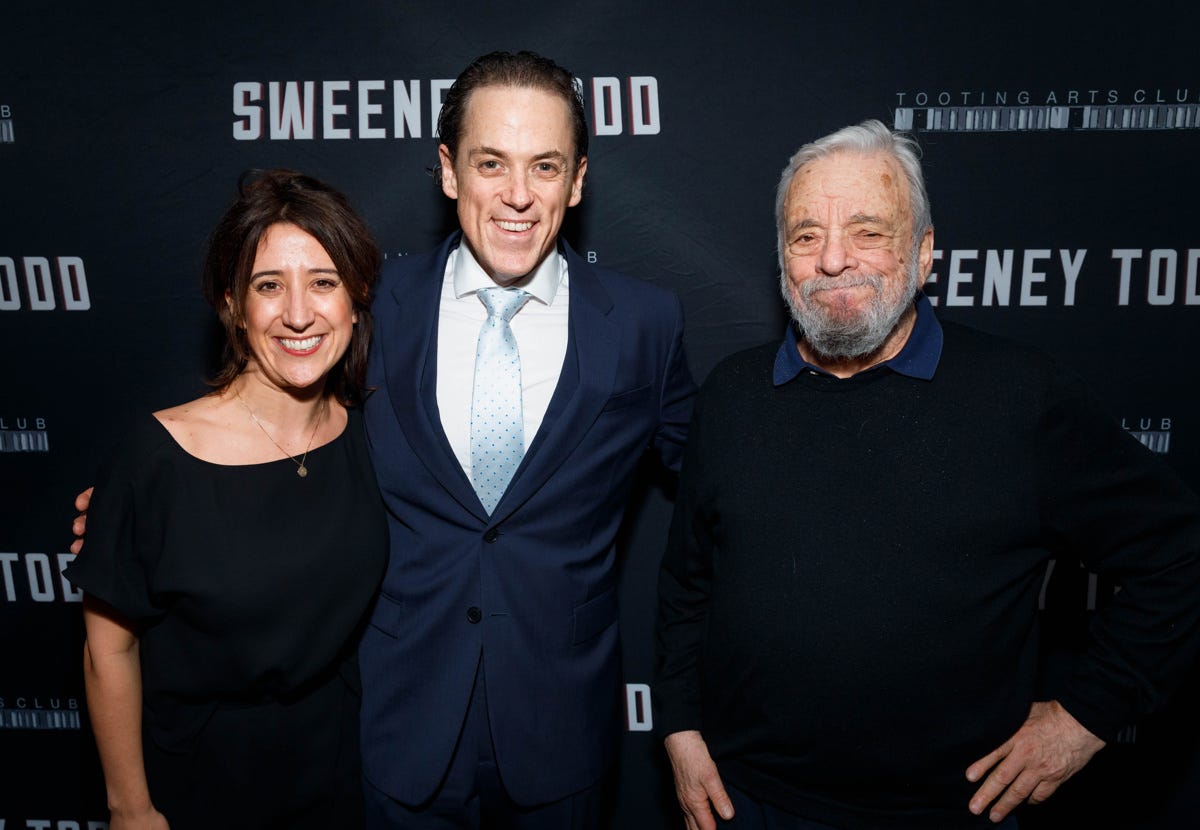A Conversation with Jeremy Secomb
We speak to Jeremy Secomb about Sweeney Todd, Old Friends, and spilling blood on Stephen Sondheim
Now that some time has passed since Old Friends, what stands out to you in particular about that production?
It was an incredible thing to be a part of, having been part of the original gala and then being asked to be involved in the actual run of the show. To work with the calibre of people that were on stage, to be a part of that, was a huge thing in my career. It really was an incredible thing to work with people like Bernadette [Peters] and Lea [Salonga], and British legends as well. To be on stage with those people and to be part of a cast bringing such an amazing tribute to Steve was an incredible highlight. It really was. To this day, even thinking about it is ridiculous. When I was given the “Make me confused / Mock me with praise” lines in “Being Alive,” I was like, “Out of all the people here, you want me to do that?!” Like, I’m really, really happy to do that—this is amazing! It’s an incredible arrangement. And that arrangement of “Being Alive,” it’s really hard, because it goes into eight-part harmony.
Yes! That glorious canon it goes into: “Somebody, somebody, somebody, somebody…”
Yeah. And it just seems to be constantly more somebodies. It’s beautiful to sing, and with the voices that we had on stage, it’s just an incredible thing to be standing there, singing that out, with those people. It was an absolute joy. It really was. And then to be standing on stage right next to Bernadette singing Sunday. As a young musical theater guy growing up in Australia, if you had said to me that I’d be on stage one day doing that… That’s just inconceivable for someone from a small country town in Australia.
I must say, it was pretty special to see Bernadette step into place as Dot, as the Sunday painting comes together. I never thought I’d have an opportunity to see that in real life.
100%. And what’s amazing about that is that every single show that we did, as soon as the music for that number started and people realized we were going to do that song, you could feel the electricity in the room. You could hear a pin drop. She was there at the beginning.
You, of course, fronted the Sweeney portion of the show. For a lot of Old Friends audience members, that might very well have been their first introduction to Sondheim. I believe that was the case for you too, wasn’t it?
It was, yeah. And then the production of Sweeney that I did, when I got to meet and work with Steve, was an incredible thing that when you look back on it should never have happened. And then to be paired up with Lea was just fantastic. Lea did such an incredible job with the Mrs. Lovett character she put together. We got on really well, and I think we worked really well on stage together too, so it was really lovely that we had that 15-20 minutes of the show where it became a little Sweeney Todd production within this amazing thing that was put together on stage.
Did it feel strange at first to be Sweeney in a larger space? Did you have to physically adjust your body language or what you were doing vocally for the different context?
Yeah. And also, in the pie shop, we had three instruments. And then all of a sudden I’ve got a band, and there are things there that I’d never heard before, other than on a recording. In rehearsals, Cameron [Mackintosh] and Matthew [Bourne] and Julia [McKenzie] were very specific about what they wanted, which was different to the production of Sweeney that I did. There was quite a bit of to-ing and fro-ing in rehearsals about what they wanted, what I felt I wanted to do, and stuff like that. We really worked together on it, and I think that it was really quite well-received.
Yes, absolutely. Are those creative conversations mostly about who these characters are and how these moments sit within the show Old Friends as opposed to a full production of Sweeney Todd?
Yeah. Cameron and Matthew kept saying, “We’re not doing a production of Sweeney Todd. This is a Sweeney Todd section.” Because certainly my character was quite dark. In the production that I did, he was quite a tortured soul and all the rest of it, which of course the character is. But, as they were saying, we couldn’t go down that road too far in Old Friends because we’re not doing the whole show. You can only go down that road fully when you’ve got the whole show to come through the other side, to show the whole story, to go into every intimate detail about each character and all the rest of it.
And in terms of the whole role of Sweeney, as someone who’s spent so much time with the character, are there particular challenges to it that might not be immediately obvious to an audience member? Are there things which only emerge after spending so much time with that character and with that show?
One of the things that I had to work on with my original director, Bill Buckhurst, when I first did it, was we talked a lot about Sweeney’s state of mind when he first gets back to London. He’s not going back to London to kill everyone. He’s coming back to find his family. That’s what he’s doing. He’s left Australia, and come back to London to get his family back. There are then certain triggers that happen. He meets Mrs. Lovett. He gets cornered by Pirelli. There are all these things that conspire, but he’s still not the killer that he is towards the end of the show until he has a mental break. So it was trying to find the progress of his character from the start of the show, and the particular points which lead him to his complete breakdown, where he just goes, “Screw it. Everyone’s going to die.” So that for me was the thing that we had to work on: those triggers and what was triggering him, and how he would react and how he would get to the point where he snaps and loses it. That for me was the thing that I tried to work on constantly in the run of me performing it.
And when Sondheim famously came to the pie shop [pictured above], what are your memories of that day? You always hope, I suppose, for a golden nugget of advice that stays with you for the rest of your life, but perhaps that isn’t always the reality of it. What can you say about that encounter?
I’ll tell you one of the things that I’ll never, ever forget. He came to the pie shop, and the pie shop was so small that only 34 people could see the show at any one time. The audience were literally right there, and he sat in the closest seat you could get to the main body of action. I covered him in blood. And we actually weren’t allowed to use much blood in the production that we did, because we were in a working pie shop. Because it was an actual pie shop, we couldn’t just spray blood everywhere. So there was only one blood bag that we used, and it was for the death of the Judge. And I have a secretion bag in my hand which I pop, and it’s supposed to just go down the white sheet on the Judge. This particular night, for some reason, the blood went through my fingers, so I snapped it and it just went forwards. And because Steve was sitting so close, it literally just went over the top of him. And there’s a massive big red light behind me, but all I can remember is a snapshot of Steve sitting in front of me with the blood going towards him in slow motion, and him leaning back, watching what happening.
After the show he stayed behind and we met him, and he was absolutely just an amazing man. One of the things he said to us was that this is how he wrote the show. This is how he wanted the show when he wrote it. This is what was in his head: this small, chamber production. He said it was 50 times scarier than any production that he’d ever seen. There are other things, like I just remember him laughing at his own jokes. I loved it, because he still found it funny. The dark humor. And I’m not going to say that I knew him extremely well personally, but from what I did know of him, I think he had quite a dark humor and he really liked that. So we’d get to certain points in the show, and he’d literally do this massive guffaw. All of a sudden, you would just hear it. And it didn’t matter how many times he saw the show, because he saw it quite a few times when we were in New York, as well as a couple of times when we transferred to the theater on Shaftesbury Avenue. But every single time, you would just hear that laughter during the show. He would just find it funny. And I loved him for it. I just thought it was amazing.
The big difference in our production to a normal theatrical production of Sweeney Todd is that we had access to the audience. And I think that, for me as Sweeney, was so brilliant, because I literally could eyeball people—and people would get uncomfortable because they knew that I was just there. I wasn’t behind a proscenium. I wasn’t up on a stage. They weren’t sitting in the dark, away from me. So when I looked at someone, you could literally feel them get uncomfortable, and that was an amazing thing, to have that reaction from an audience member, that usually in a theater situation is completely separate from the stage. In numbers like Epiphany, where he’s just running around going, “You, sir! How about a shave?” and threatening people, usually you just have someone standing there, threatening the audience—but the audience is in the dark and off the stage. In the film, it was passers-by on the street. Whereas I was diving on tables in front of people, threatening them with the razor and screaming in their faces, so I would get an immediate reaction from audience members. We had so many different reactions from people. People would laugh because they were uncomfortable. People would shout because they got scared. You never knew what you were going to get from them—and I think that’s one of the most amazing things about the production that we did.
And it wasn’t just me that had that experience. Everyone else was singing on the tables and things like that. The Johanna quartet in the second act, you’ve got Johanna and Anthony both standing on tables, so people are literally underneath them while they’re singing. It brought everything to the audience. I think Steve really liked that concept, that you became complicit in the story, in the murders, in the love story. Everything that happens in the show, the audience become complicit in it.
Since you’ve been back on more traditional stages, has that pie-shop immediacy changed anything about the way that you perform? Has it changed the way you think about connecting to various different parts of the room?
Yeah. It’s quite hard. When you’re in a stage situation with a cross-arch, you are separate. You can try and perform to bring people to you as much as you can, but it’s not that same immediate reaction from that you have when you’re standing next to them, or standing in front of them, singing in their faces. But certainly what it taught me was that you have to perform to the space that you’re in. Whether you’re in a 5,000-seat arena or a 34-seat pie shop, it’s two very different skills of the same job, if that makes sense.
Is there a Sondheim role that you’ve never tackled, that you’d love to have a go at one day?
I’d like to tackle them all. That’s the bottom line. I would kill to be in any Sondheim piece, so I’m very reluctant to pick one out, simply because they’re all incredible. There are all sorts of things. I remember when I first saw Into the Woods, just thinking, “I would just love to sing the Baker.” I’ve seen Sunday in the Park with George and I’ve gone, “Oh, I wouldn’t mind having a go at George…” And as an actor, we all go and see shows, and you can’t help but sit there and go, “Oh, I wouldn’t mind having a go at that role.” And I’ve thought that at every single Stephen Sondheim show I’ve ever seen. I remember seeing Passion at the Donmar, and I was like, “Yes!” Any production of Steve’s I would kill to be a part of, let alone pick a role. I think his music is timeless for our industry, honestly. Someone said this to me when we were in rehearsals for Old Friends. Steve was the musical theater Shakespeare for our generation. And I honestly believe that that’s true. I think for any musical theater performer, if they get a chance to do a Sondheim show, they really should jump at it, because I can only liken it to being a straight actor and doing Shakespeare—because it’s intricate, it’s glorious, it’s amazing to sing. It’s challenging. It’s hard. There are all these things to it. But it’s just glorious to be a part of.






